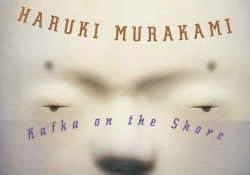Soundtracking S by J. J. Abrams and Doug Dorst
We’ve all come across books marked up by some fiend with no appreciation for the sanctity of the written word. Senseless underlining of unremarkable sentences, pedantic notes, and even doodles act as silently screaming billboards on the wide- open spaces of our imagination as we try to interact in a uniquely personal way with the book. Is it because those remnants are the self-revelation of a person we’ll most likely never meet? Even if their palimpsests manage to blow our mind more than the author’s words, that person stays just as distant to us as any revered dead writer.
By a simple addition of another margin scribbler, the 2013 novel S closes that distance. J. J. Abrams has transferred his pattern of breaking conventions in the world of screens to the literary “analog” world by collaborating with author Doug Dorst on this interactive novel where two characters carry on a conversation through the margins of a book.
I heard his voice in his letters and in our discussions in the margins of his typescripts.
OK: How can you be embarrassed by something you said—something you meant at the time—if you really think all the past versions of you are part of you now?
BECAUSE SOME THINGS ARE THAT EMBARRASSING.
The book itself is basically equivalent to a musical remixing of an old song. Inside the shiny new case is a convincing replica of a novel called Ship of Theseus published in 1949, down to its Dewey Decimal sticker and perfectly worn cover that feels as sentimentally familiar as an old T-shirt. Around the intriguingly surreal plot of Ship of Theseus are the handwritten notes of Jen, an undergrad with a gift for research and sarcasm, and Eric, a jaded grad student devoted to solving the dangerous mystery surrounding the book’s author, V. M. Straka, and his translator, F. X. Caldeira. Their interactions often steal attention away from the plot of Theseus as they begin unraveling the dark romance of Straka’s life while falling into a charmingly intelligent and unsappy romance of their own. Mementos like postcards, photographs, a navigational decoder wheel, and even a map drawn on a napkin fill the book, making us feel like a part of the story ourselves.
The only thing missing is music. So for this month’s Sound It Out feature, I went on a search for truth of my own—well, for truly good remixes, anyway. The soundtrack is meant to complement the perfect harmony of old and new that Abrams and Dorst achieved in S.
1. “You Always Hurt the One You Love/Baby Can I Hold You” by Cathy Eliot
Cathy Eliot’s combination of a classic song with Tracy Chapman’s “Baby Can I Hold You” evokes the tragic ability to feel at once so close and yet so far from a person. Her longing voice with its layered double nature wings above faint guitar strums and mirrors the complicated relationships facing Eric, Jen, and even Straka.
2. “Dream a Little Dream of Me” by The Mamas and the Papas (blnd! remix)
Continuing that theme of distance, this remix of “Dream a Little Dream of Me” lingers on Mama Cass’s voice while adding an element of mystery to it. The lyrics echo ideas throughout S of trust when it comes to the person you may love the most, and the way a very thought or dream of them can drive worries away.
3. “Am I Blue” by Billie Holiday (Billa Qause remix)
Abrams and Dorst kept the noir beat going in Jen and Eric’s relationship by turning a simple date into a clandestine affair on the back row of their college theater with a backdrop of Bogart, Hitchcock, and Welles films. A modern take on a song from one of those classic films, To Have and Have Not, adds a halting, almost stuttering quality to Holiday’s voice that manages to engage rather than annoy, much like S.
4. “Que Sera” by Wax Tailor
This diverse mash-up of Doris Day’s voice and movie quotes transposed over a steady beat highlights the sudden changes and dangers that can interrupt the normalcy of life, no matter how surreal. There is a sort of organized confusion that matches the experience of reading S with its multiple timelines, narratives, and paraphernalia.
5. “Too Darn Hot” by Ella Fitzgerald (RAC remix)
Though dangers surround Ship of Theseus main characters S and Sola, as well as Eric and Jen, the narrative has moments of lightness and joy. Even in the face of extreme danger, there are moments where “it is more important to take in the spectacular than to worry about the pressing business of staying alive.” RAC’s remix forces the music into the dramatic realm of the unknown while Fitzgerald’s playful voice keeps things from getting too serious.
6. “Wicked Games” by Parra for Cuva (feat. Anna Naklab)
Chris Isaak’s haunting “Wicked Game” gets an oddly intriguing makeover into what I’m calling Spanish Techno. Anna Naklab’s husky vocals keep the original tone intact, yet the combination of techno beats with bongo drums and guitar adds a little more hope for the future, like the supposed reconstruction of the last chapter of Ship of Theseus by Straka’s translator.
7. “House of the Rising Sun” by Lauren O’Connell
Deeply droning strings provide a background similar to the at times slow plot of Ship of Theseus while bellicose drums fight to take over her warning words.
O’Connell’s haunting version of the oft-covered rising-sun blues has the same world-weary quality that seems to get passed around between characters in S.
8. “Look” by Apple Juice Kid
Apple Juice Kid’s Frank Sinatra Remixed keeps all the integrity of almost sacred Sinatra songs yet brings them into the present. This particular song’s peppy 1960s vibe becomes more complex and suited to the slightly less carefree 2010s.
9. “1940” by The Submarines (AmpLive Remix)
Drums morph into pounding on a door, evoking the noir feeling again, and distorted nearly dubstep elements play beneath a sort of antilullaby. “1940” is like a modern bugle call, sound-tracking the characters’ awakening, as well as inciting an awakening in the reader.


















